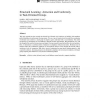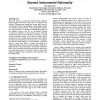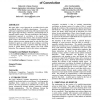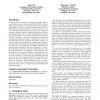10 search results - page 2 / 2 » Learning to cooperate in multi-agent social dilemmas |
CMOT
1999
13 years 7 months ago
1999
This study extends previous research that showed how informal social sanctions can backfire when members prefer friendship over enforcement of group norms. We use a type of neural...
GECCO
2008
Springer
13 years 8 months ago
2008
Springer
This study proposes an agent-based model where adaptively learning agents with local vision who are situated in the Prisoner’s Dilemma game change their strategy and location as...
GECCO
2005
Springer
14 years 29 days ago
2005
Springer
This paper offers a novel approach to coevolution based on the sociological theory of symbolic interactionism. It provides a multi-agent computational model along with experimenta...
ATAL
2009
Springer
14 years 2 months ago
2009
Springer
Certain observable features (tags), shared by a group of similar agents, can be used to signal intentions and can be effectively used to infer unobservable properties. Such infere...
ATAL
2008
Springer
13 years 9 months ago
2008
Springer
In this paper, we investigate multi-agent learning (MAL) in a multi-agent resource selection problem (MARS) in which a large group of agents are competing for common resources. Si...




